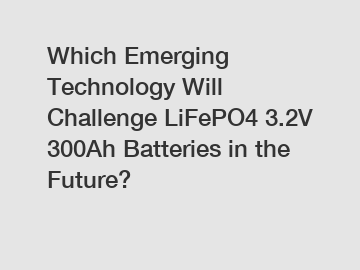Dec. 19, 2023
Energy
Which Emerging Technology Will Challenge LiFePO4 3.2V 300Ah Batteries in the Future?
In the ever-evolving world of technology, batteries play a crucial role. They power our smartphones, electric vehicles, and even renewable energy storage systems. The LiFePO4 3.2V 300Ah battery has gained popularity for its long life, efficiency, and safety features. However, as with any technological advancement, there is always the question of what lies ahead. Which emerging technology will challenge LiFePO4 3.2V 300Ah batteries in the future? Let's explore some potential contenders.
1. Solid-State Batteries: One technology that shows great promise is solid-state batteries. Unlike conventional Li-ion batteries that use a liquid electrolyte, solid-state batteries utilize a solid electrolyte. This enhances both safety and energy density. Solid-state batteries have the potential to store more energy, exhibit faster charging times, and offer longer lifespans than LiFePO4 batteries. Researchers are actively working on overcoming manufacturing challenges and increasing scale for commercial adoption.

2. Lithium-Sulfur Batteries: Another emerging technology that has the potential to challenge LiFePO4 batteries is Lithium-Sulfur (Li-S) batteries. Li-S batteries have a higher theoretical energy density, meaning they can store more energy for their weight. They are also cheaper and more environmentally friendly due to the abundance and recyclability of sulfur. Researchers are focusing on addressing issues like low cycle life and poor stability to make Li-S batteries viable for widespread usage.
3. Graphene-Based Batteries: Graphene, a revolutionary material known for its exceptional properties, holds promise for battery technology too. Graphene-based batteries can provide higher energy density, faster charging speeds, and longer lifespans compared to LiFePO4 batteries. Additionally, these batteries could be produced using more sustainable and available materials. However, scalability and cost are still challenges that need to be overcome before they can fully challenge LiFePO4 batteries.
4. Sodium-Ion Batteries: While lithium-ion batteries dominate the market currently, sodium-ion batteries are being explored as a potential alternative. Sodium, being more abundant than lithium, makes these batteries more cost-effective. Although sodium-ion batteries have lower energy density, they could still find applications in stationary energy storage systems. Research is progressing to improve energy density and cycle life, making them a viable competitor to LiFePO4 batteries.
In conclusion, LiFePO4 3.2V 300Ah batteries have undoubtedly revolutionized the energy storage industry, providing safe and efficient power solutions. However, as technology advances, new contenders are emerging. Solid-state batteries, lithium-sulfur batteries, graphene-based batteries, and sodium-ion batteries are gaining attention for their potential to challenge LiFePO4 batteries in the future. While each of these technologies has its own set of challenges, researchers and engineers are actively working towards overcoming them and creating a more sustainable and efficient battery future. As we eagerly await these advancements, one thing remains certain: the future of batteries is an exciting frontier of innovation.
For more lifepo4 battery 12 8v 400ah, lifepo4 battery 12 8v 400ah, 12v 400ah Lifepo4 Batteryinformation, please contact us. We will provide professional answers.
If you are interested in sending in a Guest Blogger Submission,welcome to write for us!
All Comments ( 0 )